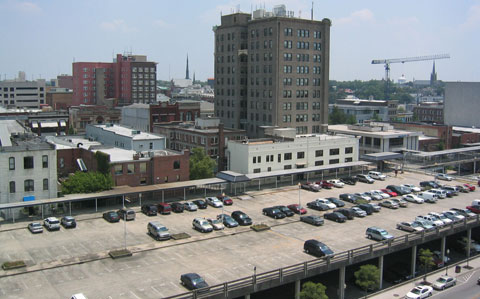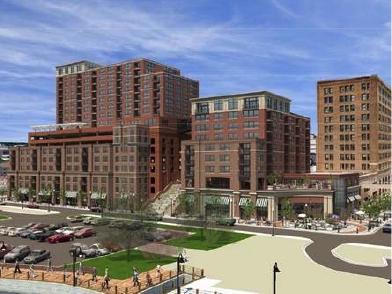|
|
DFI Case Study: Attracting Private Investment for the Redevelopment of a Downtown Parking DeckBy Marcia PerrittPublished August 20, 2015
Wilmington is one of North Carolina’s largest and fastest growing cities and a popular tourist destination. Its downtown area is an economic and social hub for the region. With a nearly 300-block historic district, the area includes cobblestone streets with ancient trees and lovingly restored historic homes, restaurants, shops, music and art venues, hotels, a river walk, a college campus, and a convention center. The Challenge The two-story Water Street Parking Deck was constructed in the 1960s and sits on 1.2 acres along Water Street overlooking the Cape Fear River. Though it is nearing functional obsolescence, the parking deck serves as primary public parking for tourists and locals alike. Surrounded by vibrant retail and entertainment businesses, the parking deck is an eyesore. City officials long believed that a parking structure alone was not the highest and best use for the high-profile location. They envisioned a future for the site that would spur additional private investment while respecting the historic fabric of the surrounding built environment. What city officials hoped would be a straightforward redevelopment project was much more complicated. In the last two decades, the city released two different Requests for Proposals that received no responses from the private sector. Numerous factors made consideration of development particularly challenging. The property was constrained by the physical limitations of a site surrounded by existing structures and the necessity to provide generous space for public parking. There was public discord over the use and density of the site as well as a lack of a shared vision among political leadership. Meantime, owners of other valuable downtown properties had put redevelopment on hold until the parking deck could be refurbished. Frustrated by the lack of interest in what they saw as a desirable development opportunity, city officials turned to the School of Government—a long-trusted and respected resource to local municipalities. In 2013, the city hired the School’s Development Finance Initiative (DFI) to help. Roger Johnson, the City of Wilmington’s special assistant to the city manager for economic development, has been a central participant in the search for a viable solution to the Water Street Parking Deck. “Our decision to hire DFI for this project,” he said, “was greatly influenced by its association with the School of Government and the broad expertise they bring to the table.” The Project The city asked DFI to define an economically feasible redevelopment project for the parking deck that would be attractive to the private sector while also serving varied (and sometimes competing) public interests. DFI led a 12-month pre-development process that guided the city to key decision points about the program, the public investment, the structure of the public-private partnership, and selection of a private sector partner. This iterative process included a market analysis, site analysis, public stakeholder engagement, and financial feasibility modeling. The market analysis provided an assessment of supply and demand dynamics aimed at understanding what types of specific uses (residential, retail, office, hotel, and parking) the downtown market could support. For the site analysis, DFI directed an architecture firm in their work to determine the configuration and massing of the potential redevelopment uses identified through the market analysis. DFI also worked Allen Davis, urban designer in the city’s Planning, Development, and Transportation Department, to make sure the parking deck project would integrate seamlessly into its surroundings. This included urban design elements as related to adjacent building and public space, as well as emphasizing the important connection an elevated walkway provides between the redevelopment site and several existing businesses on Front Street. Public engagement occurred throughout the pre-development process and took on several forms – one-on-one meetings, an online survey, public forums, and small group stakeholder meetings. Finally, DFI performed a financial feasibility analysis of the proposed redevelopment program, informed by the site and market analyses, as well public interests collected through stakeholder engagement and endorsed by city officials. DFI’s pre-development process resulted in an economically sound program and partnership structure for the parking deck, which DFI then used to actively recruit qualified private developers to the project. The city received proposals from eight development teams from across the Southeast, and with DFI’s guidance, selected a skilled development partner with a successful track record in mixed-use projects in urban cores. The Impact Roger Johnson noted an additional unanticipated benefit to the process. “DFI brought in eight developers who had not before considered Wilmington for development, but who, because of DFI’s intervention, were willing to consider building something transformative in our community,” he said. “And now, in addition to the parking deck project, I am still in contact with another five of the developers who are considering other large scale projects around the city.” Johnson describes the parking deck and the possibility of additional business as having the potential to “transform our urban core in a powerful manner and result in large scale capital projects that will improve our community overall.” Special thanks to Gini Hamilton for her assistance in creating this post. |
Published August 20, 2015 By Marcia Perritt
 The City of Wilmington, North Carolina, hired the Development Finance Initiative (DFI) in 2013 to conduct a pre-development process for the Water Street Parking Deck. The parking deck is an aging public parking facility prominently located in the city’s historic downtown on the Cape Fear riverfront.
The City of Wilmington, North Carolina, hired the Development Finance Initiative (DFI) in 2013 to conduct a pre-development process for the Water Street Parking Deck. The parking deck is an aging public parking facility prominently located in the city’s historic downtown on the Cape Fear riverfront.
Wilmington is one of North Carolina’s largest and fastest growing cities and a popular tourist destination. Its downtown area is an economic and social hub for the region. With a nearly 300-block historic district, the area includes cobblestone streets with ancient trees and lovingly restored historic homes, restaurants, shops, music and art venues, hotels, a river walk, a college campus, and a convention center.
The Challenge
The two-story Water Street Parking Deck was constructed in the 1960s and sits on 1.2 acres along Water Street overlooking the Cape Fear River. Though it is nearing functional obsolescence, the parking deck serves as primary public parking for tourists and locals alike. Surrounded by vibrant retail and entertainment businesses, the parking deck is an eyesore.
City officials long believed that a parking structure alone was not the highest and best use for the high-profile location. They envisioned a future for the site that would spur additional private investment while respecting the historic fabric of the surrounding built environment.
What city officials hoped would be a straightforward redevelopment project was much more complicated. In the last two decades, the city released two different Requests for Proposals that received no responses from the private sector. Numerous factors made consideration of development particularly challenging. The property was constrained by the physical limitations of a site surrounded by existing structures and the necessity to provide generous space for public parking. There was public discord over the use and density of the site as well as a lack of a shared vision among political leadership.
Meantime, owners of other valuable downtown properties had put redevelopment on hold until the parking deck could be refurbished.
Frustrated by the lack of interest in what they saw as a desirable development opportunity, city officials turned to the School of Government—a long-trusted and respected resource to local municipalities. In 2013, the city hired the School’s Development Finance Initiative (DFI) to help.
Roger Johnson, the City of Wilmington’s special assistant to the city manager for economic development, has been a central participant in the search for a viable solution to the Water Street Parking Deck. “Our decision to hire DFI for this project,” he said, “was greatly influenced by its association with the School of Government and the broad expertise they bring to the table.”
The Project
The city asked DFI to define an economically feasible redevelopment project for the parking deck that would be attractive to the private sector while also serving varied (and sometimes competing) public interests.
DFI led a 12-month pre-development process that guided the city to key decision points about the program, the public investment, the structure of the public-private partnership, and selection of a private sector partner. This iterative process included a market analysis, site analysis, public stakeholder engagement, and financial feasibility modeling.
The market analysis provided an assessment of supply and demand dynamics aimed at understanding what types of specific uses (residential, retail, office, hotel, and parking) the downtown market could support. For the site analysis, DFI directed an architecture firm in their work to determine the configuration and massing of the potential redevelopment uses identified through the market analysis.
DFI also worked Allen Davis, urban designer in the city’s Planning, Development, and Transportation Department, to make sure the parking deck project would integrate seamlessly into its surroundings. This included urban design elements as related to adjacent building and public space, as well as emphasizing the important connection an elevated walkway provides between the redevelopment site and several existing businesses on Front Street.
Public engagement occurred throughout the pre-development process and took on several forms – one-on-one meetings, an online survey, public forums, and small group stakeholder meetings. Finally, DFI performed a financial feasibility analysis of the proposed redevelopment program, informed by the site and market analyses, as well public interests collected through stakeholder engagement and endorsed by city officials.
DFI’s pre-development process resulted in an economically sound program and partnership structure for the parking deck, which DFI then used to actively recruit qualified private developers to the project. The city received proposals from eight development teams from across the Southeast, and with DFI’s guidance, selected a skilled development partner with a successful track record in mixed-use projects in urban cores.
The Impact
Roger Johnson noted an additional unanticipated benefit to the process. “DFI brought in eight developers who had not before considered Wilmington for development, but who, because of DFI’s intervention, were willing to consider building something transformative in our community,” he said. “And now, in addition to the parking deck project, I am still in contact with another five of the developers who are considering other large scale projects around the city.”
Johnson describes the parking deck and the possibility of additional business as having the potential to “transform our urban core in a powerful manner and result in large scale capital projects that will improve our community overall.”
Special thanks to Gini Hamilton for her assistance in creating this post.
Author(s)
Tagged Under
This blog post is published and posted online by the School of Government to address issues of interest to government officials. This blog post is for educational and informational Copyright ©️ 2009 to present School of Government at the University of North Carolina. All rights reserved. use and may be used for those purposes without permission by providing acknowledgment of its source. Use of this blog post for commercial purposes is prohibited. To browse a complete catalog of School of Government publications, please visit the School’s website at www.sog.unc.edu or contact the Bookstore, School of Government, CB# 3330 Knapp-Sanders Building, UNC Chapel Hill, Chapel Hill, NC 27599-3330; e-mail sales@sog.unc.edu; telephone 919.966.4119; or fax 919.962.2707.


